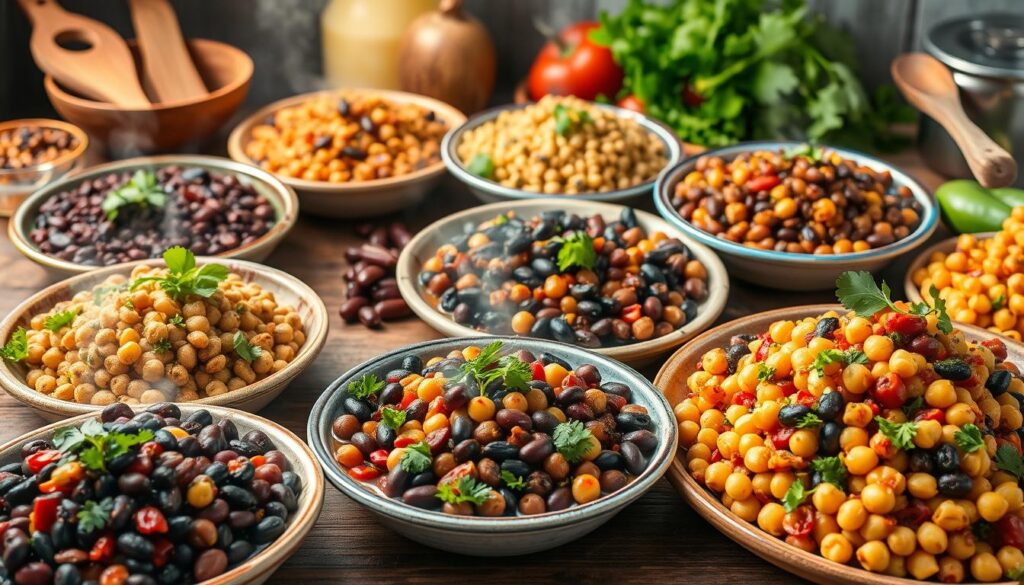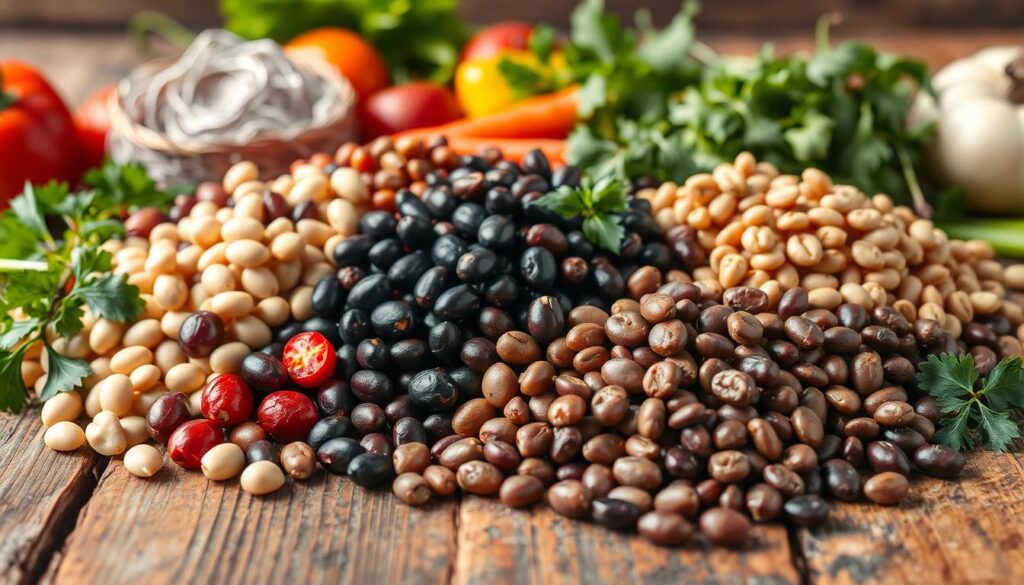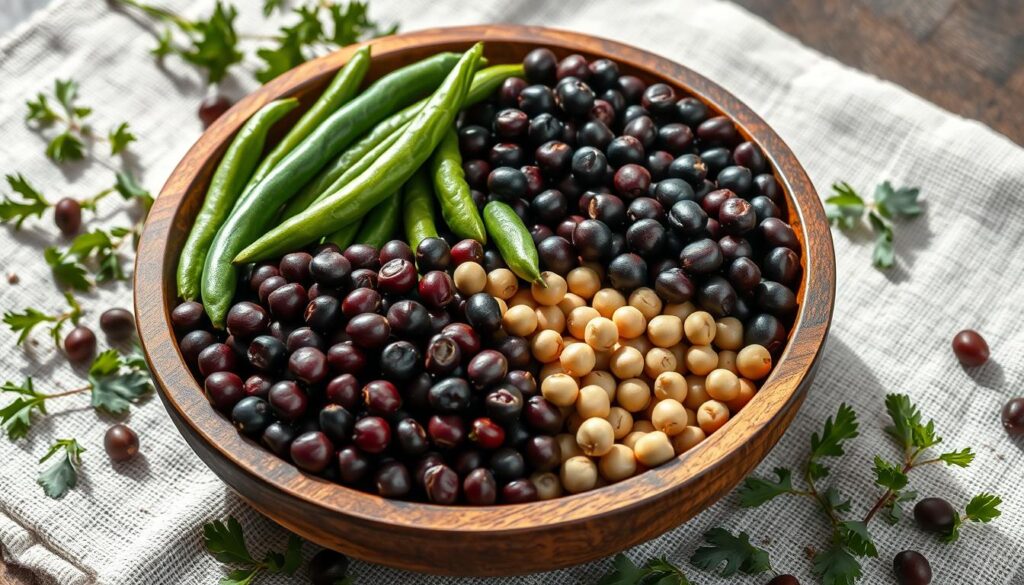Starting a low-carb diet might make you think beans are off-limits. But, not all beans are the same. Some, like low carb diet beans, can help you lose weight. We’ll look at the top low-carb bean choices for your weight loss journey.
Key Takeaways
- Green beans have only 2.4g net carbs per 100g, making them a good choice.
- Black soybeans are another low-carb option with 4.5g net carbs per 100g.
- Edamame (young soybeans) have 6.7g net carbs per 100g and are rich in protein.
- Adding low-carb beans to your diet can help you lose weight and get important nutrients.
- It’s important to control your portions and how you prepare beans on a low-carb diet.
Understanding Beans in a Low-Carb Lifestyle
Beans are full of good stuff like vitamins, fiber, and protein. A cup of black, pinto, or garbanzo beans has about 15g of protein and 12-16g of fiber. These help you feel full and can help with weight management.
Benefits of Including Beans in Your Diet
Adding high protein legumes and fiber-rich beans to a low-carb diet has many benefits. The protein and fiber in beans make you feel full. This can help you eat less. Also, the carbs in beans are slow to digest, which can help keep your blood sugar stable.
The Carbohydrate Challenge
But, most beans like black, pinto, and chickpeas have a lot of carbs. A cup of these beans can have 40g or more of carbs. This can be a problem for people on low-carb diets that usually allow 20-100g of carbs a day.
Impact on Weight Loss Goals
The effect of beans on weight loss depends on how much you eat and choosing the right beans. Beans are good for you, but you need to watch their carbs if you’re trying to lose weight on a low-carb diet. Pick low glycemic index beans and watch your portion sizes to make beans work for your weight loss goals.
| Bean Variety | Net Carbs per Cup |
|---|---|
| Baked Beans | 37.9g |
| Chickpeas | 32.5g |
| Pinto Beans | 29.4g |
| Red Kidney Beans | 29.0g |
| Navy Beans | 28.0g |
| Green Beans | 5.8g |
| Black Soybeans | 8.0g |
“Incorporating high protein legumes and fiber-rich beans into a low-carb diet can offer several advantages.”
The Role of Fiber and Protein in Low Carb Diet Beans
Beans are great for a low-carb diet because of fiber and protein. They are full of nutrients and help keep you full. This is good for those watching their carbs.
Fiber in beans helps you feel full longer. It also makes you eat less. For example, black soybeans have 18.2 grams of protein per 100 grams. This is good for those who don’t eat meat.
Beans are also good for your stomach and blood sugar. Eating beans can help you lose weight and feel better. They are full of fiber and protein.
| Bean Variety | Protein (g/100g) | Fiber (g/100g) | Net Carbs (g/100g) |
|---|---|---|---|
| Black Beans | 21.8 | 15.0 | 25.8 |
| Kidney Beans | 23.6 | 13.1 | 29.1 |
| Pinto Beans | 21.4 | 15.4 | 29.4 |
| Chickpeas | 15.0 | 12.5 | 32.5 |
| Green Beans | 2.0 | 2.7 | 5.8 |
| Black Soybeans | 18.2 | 10.0 | 10.0 |
Knowing about fiber and protein in beans helps you make better choices. It supports your diet and health goals.
Top Low-Carb Bean Options for Weight Management
Beans might seem like a no-go on low-carb diets like keto or paleo. But, some beans can help with weight loss. Let’s look at some low-carb bean options that are good for your health and fitness.
Green Beans: The Ultimate Low-Carb Choice
Green beans are the best low-carb bean choice, with only 2.4 grams of net carbs per 100 grams. You can roast them with olive oil and nutritional yeast for a tasty snack or side. They’re great for strict paleo-approved beans diets because they’re so versatile.
Black Soybeans: A Versatile Alternative
Black soybeans are also good for low-carb diets, with as little as 2 grams of net carbs per cup. You can swap them for regular beans in many recipes. They’re a tasty and healthy option.
Edamame: Young Soybeans for Health
Edamame, or young soybeans, have 6.7 grams of net carbs per 100 grams. They’re full of protein and can be eaten hot or cold. Adding edamame to your low-carb diet can make your meals more interesting.
Adding these low-carb beans to your diet can bring fiber and protein benefits. You can still reach your weight loss goals. Try different ways to cook and use keto-friendly pulses and paleo-approved beans to find your favorites.
Smart Portion Control and Serving Suggestions
When you add carb-conscious bean recipes to your diet, watch your portions. For less strict diets, aim for a quarter-cup serving. This helps keep your carb intake low.
Add beans to your salads for a filling lunch. Or make cold side dishes with pinto beans and veggies.
Want a tasty, weight loss friendly beans snack? Try 2 tablespoons of hummus with celery or broccoli. Roasted chickpeas are also great, seasoned with olive oil and spices.
These tips help you enjoy beans without overdoing carbs. With careful planning and portion control, you can fit beans into your carb-conscious diet. This way, you can reach your health goals.
| Low-Carb Serving Suggestions | Carb Content |
|---|---|
| 1/4 cup of beans | 6-10 grams of carbs |
| 2 tablespoons of hummus | 3-5 grams of carbs |
| 1/2 cup of roasted chickpeas | 10-15 grams of carbs |
It’s all about finding the right balance. Enjoy beans’ nutritional benefits while keeping carbs low. With a bit of creativity and portion control, you can easily add these legumes to your carb-conscious diet.
Nutritional Comparison of Popular Bean Varieties
Following a low-carb diet means watching the carbs in beans. Some beans have more carbs than others. Let’s look at the nutrition of popular beans for your diabetic diet bean options and low glycemic index beans.
Net Carb Content Analysis
Net carbs are key when choosing beans. Here’s a quick look:
- Green beans: 2 grams of net carbs per 1/2 cup
- Black soybeans: 2 grams of net carbs per 1/2 cup
- Edamame: 6 grams of net carbs per 1/2 cup
- Traditional beans like black beans: 12 grams of net carbs per 1/2 cup
Green beans and black soybeans are great low glycemic index beans. Edamame and black beans have more carbs.
Protein and Fiber Ratios
Protein and fiber are also important for a low-carb diet. Here’s a quick comparison:
| Bean Variety | Protein (per 1/2 cup) | Fiber (per 1/2 cup) |
|---|---|---|
| Green beans | 2.2 grams | 1.9 grams |
| Black soybeans | 18.2 grams | 3.9 grams |
| Edamame | 9 grams | 2.2 grams |
Green beans and black soybeans are full of protein and fiber. They’re great for a low-carb diet. They help you feel full and are good for your health.
Cooking Methods to Reduce Carb Content
If you’re on a carb-conscious bean recipes or low carb diet beans plan, there are ways to cook beans that lower carbs. You can make small changes to enjoy beans without ruining your diet.
Soaking dried beans before cooking is a good idea. It helps remove carbs that can make you feel bloated. Always cook the beans in fresh water to cut down carbs more.
Canned beans are also a low-carb choice. But watch out for added sugars or sauces that raise carb counts. Cooking them until tender makes them easier to digest.
Roasting or sautéing green beans is better than boiling. It boosts their taste without adding carbs. Black soybeans fit well in most bean recipes. Edamame can be steamed or boiled briefly to stay low in carbs.

Trying these cooking methods lets you enjoy beans’ health benefits while keeping carbs low. A balanced diet with low-carb foods is important for losing weight.
Bean Alternatives for Strict Low-Carb Diets
Following a strict low-carb or ketogenic diet can be tough. Finding good bean substitutes is key. With a bit of creativity, you can enjoy bean-like dishes without the carbs. Let’s look at some keto-friendly pulses and paleo-approved beans for you.
Vegetable-Based Substitutes
Mushrooms are great for low-carb diets. They soak up flavors and feel like meat. Eggplant works well in dips and spreads, like hummus.
Zucchini and yellow squash are also good. They have a bean-like texture but are low in carbs.
Protein-Rich Alternatives
Ground meat or diced sausage are good for protein. They’re perfect in recipes that usually have beans. Tofu is another option. It’s a bean-like protein with only 1.4g of net carbs per 100g.
“Legumes, such as beans, lentils, peas, and chickpeas contain significant amounts of carbohydrates, making them a challenge for those on strict low-carb diets.”
Try these keto-friendly pulses and paleo-approved beans to keep your diet on track. They let you enjoy your favorite flavors and textures. Experiment with these options to make tasty meals that fit your diet.
Managing Digestive Health with Low Carb Beans
Adding fiber-rich beans to a low-carb diet can really help your health. But, you might feel more gas and bloating at first. This is because of the extra fiber.
This feeling will go away as your body gets used to the fiber. To feel better, start with small amounts of beans. Make sure to cook them right. Taking Beano might also help some people.
Also, drink more water when eating fiber-rich beans. This helps avoid discomfort and keeps your digestive system working well. With these tips, you can enjoy the good stuff from metabolic health beans and stay healthy.
| Bean Variety | Net Carbs per 1/2 Cup | Resistant Starch Content |
|---|---|---|
| Black Soybeans | 1-2 grams | Moderate |
| Green Beans | 3-4 grams | Low |
| Edamame | 5-6 grams | Moderate |
| Chickpeas | 13-15 grams | Moderate |
By adding metabolic health beans to your diet carefully, you can get all their benefits. This helps your overall health and well-being.

“Beans are a fantastic source of fiber, protein, and complex carbohydrates, making them an excellent addition to any low-carb diet.”
Conclusion
Low-carb bean options like green beans, black soybeans, and edamame are great for weight loss diets. They have important nutrients, fiber, and protein but not much carb. By knowing their nutritional values and using smart strategies, you can enjoy beans while keeping your carb intake low.
It’s important to control how much you eat and how you cook your beans. This helps with digestion when you eat low carb diet beans, weight loss friendly beans, and keto-friendly pulses. For those on very low-carb or keto diets, there are vegetable and protein-rich options. They let you keep your meals tasty and nutritious.
By using low-carb bean options, you can make a healthy and lasting eating plan. This plan helps you reach your weight loss goals and improves your health. With the right information and planning, you can enjoy beans and stick to your low-carb diet.


A Life-Changing Experience with This Weight Loss Supplement (Nagano Tonic)
I’ve always struggled with finding a weight loss solution that actually works for me. Like many, I’ve tried numerous diets, exercise routines, and supplements over the years—some worked for a short time, but nothing ever gave me long-term results. That was until I decided to try the weight loss supplement I found : Link to the Supplement.
From the moment I started using it, I noticed a difference. Not only did I feel more energized, but my cravings also became more manageable. The best part? I started seeing results much quicker than I anticipated! Over the course of just a few weeks, I noticed a significant reduction in belly fat and overall weight loss that I hadn’t been able to achieve before.
What makes this supplement stand out from all the others I’ve tried is how it supports me in my daily routine without any jitters or energy crashes. I’m able to stay focused and motivated, which has made it easier to stay on track with my diet and exercise plan.
This product truly exceeded my expectations, and I feel more confident and healthier than ever before. If you’re struggling with your weight loss journey like I was, I highly recommend giving this supplement a try. It’s been a game-changer for me, and I’m sure it can work wonders for you too!
Contant Them on email .. tonicnagano50@gmail.com
I’ve tried so many weight loss products over the years, but nothing worked like this supplement! Since I started using it, I’ve noticed a big difference in my energy levels and appetite control. In just a few weeks, I’ve lost weight and feel so much better. It’s been easy to stick with, and the results speak for themselves. Highly recommend this to anyone looking to make a real change!
wasn’t sure what to expect, but this weight loss supplement has really impressed me! After just a few weeks of use, I’ve already dropped a few pounds and feel more motivated to stay active. It’s helped curb my cravings and boosted my energy throughout the day. I’m excited to keep going and see even better results. Definitely worth trying!
Reach them on tonicnagano50@gmail.com
I was skeptical at first, but this supplement has truly made a difference in my weight loss journey. I’ve lost weight without feeling deprived or sluggish. My cravings are under control, and I feel more confident in my body. It’s easy to incorporate into my daily routine, and the results speak for themselves. I’m so glad I gave it a try!
Thanks David, i do use the link to make my purchase. you can get too here http://surl.li/iasppy
I’ve tried so many weight loss products, but this one has been by far the most effective. In just a few weeks, I’ve noticed a visible difference in my body and energy levels. It’s helped me stay on track without the constant hunger pangs and cravings. I’m really happy with my progress and can’t wait to see where I’ll be in another month!
This Nagano Tonic has been amazing! In just a few weeks, I’ve lost weight, feel more energized, and my cravings are under control. Highly recommend it!
Thats the link to purchase http://surl.li/iasppy